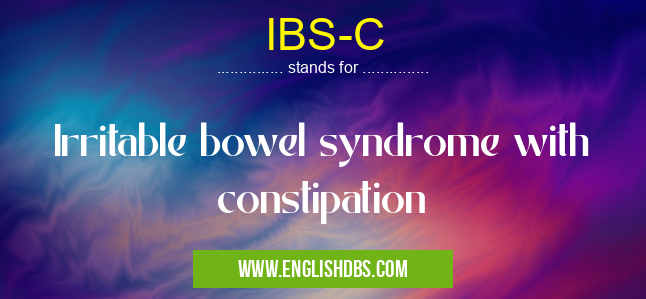What does IBS-C mean in LABORATORY
Irritable bowel syndrome with constipation (IBS-C) is a common functional gastrointestinal disorder characterized by abdominal pain and constipation. It is a subtype of irritable bowel syndrome (IBS), a group of conditions that affect the large intestine (colon).

IBS-C meaning in Laboratory in Medical
IBS-C mostly used in an acronym Laboratory in Category Medical that means Irritable bowel syndrome with constipation
Shorthand: IBS-C,
Full Form: Irritable bowel syndrome with constipation
For more information of "Irritable bowel syndrome with constipation", see the section below.
» Medical » Laboratory
What does IBS-C Stand for?
IBS-C stands for Irritable Bowel Syndrome with Constipation.
Symptoms of IBS-C
The primary symptoms of IBS-C include:
- Abdominal pain: This is the most common symptom, typically described as a cramping or aching sensation that is relieved by bowel movements.
- Constipation: Difficulty passing stool, with stools that are hard, dry, and infrequent (less than three times per week).
- Bloating: A feeling of fullness or pressure in the abdomen.
- Gas: Excessive gas production and flatulence.
- Alternating bowel movements: Occasionally, individuals with IBS-C may experience episodes of alternating constipation and diarrhea.
Causes of IBS-C
The exact cause of IBS-C is unknown, but it is thought to be related to a combination of factors, including:
- Altered gut motility: Abnormal contractions of the intestinal muscles can lead to constipation.
- Visceral hypersensitivity: Increased sensitivity to pain signals from the intestines.
- Stress and anxiety: Stress can trigger or worsen IBS symptoms.
- Dietary factors: Certain foods, such as FODMAPs (fermentable oligosaccharides, disaccharides, monosaccharides, and polyols), can exacerbate symptoms.
Diagnosis of IBS-C
IBS-C is diagnosed based on the patient's symptoms and a thorough medical history. There is no specific test that can diagnose IBS-C, but your doctor may order tests to rule out other conditions, such as:
- Blood tests: To check for infections or other medical conditions.
- Stool tests: To test for parasites or other infections.
- Colonoscopy: A procedure to examine the inside of the colon.
Treatment for IBS-C
There is no cure for IBS-C, but treatment can help manage symptoms. Treatment options may include:
- Dietary changes: Avoiding trigger foods, such as FODMAPs, can help reduce symptoms.
- Medication: Laxatives, antispasmodics, and antidepressants can be used to relieve constipation and pain.
- Stress management techniques: Relaxation techniques, such as yoga, meditation, and deep breathing, can help reduce stress and improve symptoms.
- Counseling: Talking to a therapist can help individuals cope with the emotional and psychological aspects of IBS-C.
Essential Questions and Answers on Irritable bowel syndrome with constipation in "MEDICAL»LABORATORY"
What is IBS-C?
Irritable bowel syndrome with constipation (IBS-C) is a common functional bowel disorder characterized by abdominal pain, constipation, and changes in bowel habits.
What are the symptoms of IBS-C?
Symptoms of IBS-C include abdominal pain, bloating, gas, constipation (having less than 3 bowel movements per week), hard stools, straining during bowel movements, and a feeling of incomplete evacuation after a bowel movement.
What are the causes of IBS-C?
The exact cause of IBS-C is unknown, but it is thought to be related to abnormalities in the gut-brain connection, gut microbiota (bacteria in the digestive tract), and stress.
How is IBS-C diagnosed?
IBS-C is diagnosed based on the patient's symptoms and a physical examination. Your doctor may also order tests to rule out other conditions, such as colon cancer or inflammatory bowel disease.
How is IBS-C treated?
Treatment for IBS-C focuses on managing symptoms and improving quality of life. Treatment options may include dietary changes, lifestyle modifications, medications, and stress management techniques.
What dietary changes can help with IBS-C?
Dietary changes that may help with IBS-C include increasing fiber intake, drinking plenty of fluids, and avoiding certain trigger foods that worsen symptoms.
What lifestyle modifications can help with IBS-C?
Lifestyle modifications that may help with IBS-C include regular exercise, getting enough sleep, and managing stress.
What medications are used to treat IBS-C?
Medications used to treat IBS-C include laxatives, antispasmodics, antidepressants, and probiotics.
How common is IBS-C?
IBS-C is a common condition, affecting approximately 10-15% of the population.
Final Words: IBS-C is a common functional gastrointestinal disorder that can significantly impact quality of life. While there is no cure, effective treatments are available to manage symptoms and improve well-being. Individuals experiencing symptoms consistent with IBS-C should consult a healthcare professional for proper diagnosis and treatment options.
